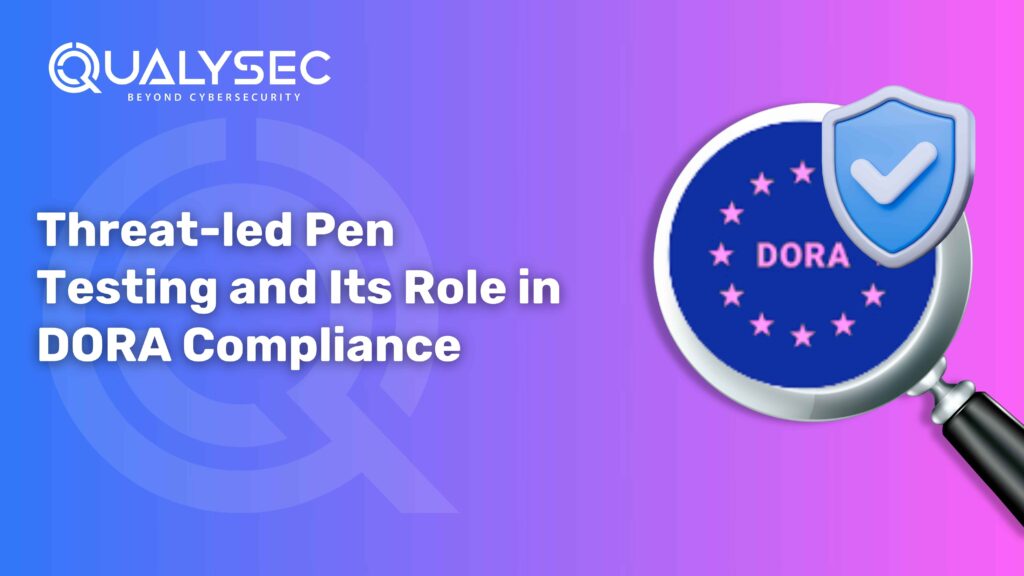Threat-led Penetration Testing and Its Role in DORA Compliance
Financial institutions and suppliers of vital infrastructure are facing increasing pressure to strengthen their cyber resilience in the face of growing cyberattacks. In the European Union, where the Digital Operational Resilience Act (DORA) has become a cornerstone of financial cybersecurity, the regulatory landscape is also becoming more stringent. The use of Threat-led Penetration Testing (TLPT) is arguably the most crucial component of achieving and maintaining DORA compliance. Today, Qualysec Technologies will explain Threat-led Penetration Testing (TLPT), its importance in the current cyber era, and how it is central to DORA compliance. We will also go over how companies can strategically use TLPT to improve security posture and meet regulatory requirements. What is Threat-led Penetration Testing? Threat-led Penetration Testing is a type of thorough security testing that replicates tactics, techniques, and procedures (TTP) of cyber adversaries. Unlike regular penetration testing, which often follows a checklist or scope, Threat-led Penetration Testing is based on intelligence and tailored to the threat universe and risk profile of the organization. The goal of Threat-led Penetration Testing is to imitate an authentic cyberattack so your organization can evaluate the detection, response, and recovery capabilities of an advanced persistent threat (APT). In truth, Threat-led Penetration Testing is not only a technical exercise but a test of your organization’s resilience. This type of testing can also be known as: The Importance of Threat-led Penetration Testing in Cybersecurity In a world with rapidly evolving digital threats, organizations are now faced with a continuum of threats to their security that is becoming more complex. In response to this growing problem, traditional security assessments have become ineffective against advanced, persistent threats. Threat-led penetration testing has undoubtedly become another key part of the solution. Here are the three reasons why it is important in cybersecurity programs – Simulates Real-World Threat Scenarios Identifies Critical Weaknesses Before They Are Exploited Improves Incident Response Readiness Aligns Cybersecurity with Business Risk Strengthens Regulatory Compliance Protects Brand Reputation and Customer Trust Enhances Teamwork and Collaboration Assists Continuous Improvement Latest Penetration Testing Report Download Threat-led Penetration Testing Frameworks within DORA Organizations preparing for DORA compliance are expected to adopt these frameworks or align their TLPT with these frameworks. DORA doesn’t set up a new TLPT framework from scratch. Instead, it draws on the existing frameworks, such as – CBEST (UK) – This framework has been established by the Bank of England and represents a combination of threat intelligence and continuous penetration testing for testing the resilience of financial services. TIBER-EU (EU-Wide) – Threat Intelligence-based Ethical Red Teaming (TIBER-EU) is a well-known TLPT framework in the EU and a de facto framework for TLPT under DORA. iCAST (Asia) – Developed by the Hong Kong Monetary Authority, it is representative of TLPT principles for Asia and is similar in scope to TIBER-EU and CBEST. Key Phases of Threat-led Penetration Testing Threat-led Penetration Testing is conducted effective methodology, statistically aligned with capture, basic agreements, and accountable frameworks like TIBER-EU (Threat Intelligence – Based Ethical Red Teaming) or CBEST, and every part of the methodology is methodically structured to test a real cyberattack scenario. Hence, it is a reflection of an organization’s known and unknown security posture. Scoping & Planning Defines the goals, boundaries, and regulatory agreement for the test. Defines the systems, people and processes (known as the “critical functions”) that will be tested. All key stakeholders are aligned, including the legal and compliance teams. Defines how broadly and deeply we are going to take the pen test. Threat Intelligence Gathering Identify the real-world cyber threats against that organization using threat intelligence. Profile the likely adversary, including their tactics, techniques, and procedures (TTPs). Use the intelligence collected from OSINT, web, and closed sources. This step is extremely important as it allows the pen test to reflect a current threat landscape. Developing Threat Scenarios Develop threat scenarios based on the intelligence gathered from the previous step. Simulate threat scenarios based on specific attack paths, realistic threat actors may take. Depending on the threat scenario, this could include social engineering, lateral movement, privilege escalation, and exfiltration of data. Ensure that all scenarios are approved and validated to ensure they are relevant and comply with set regulatory boundaries. Red Team Engagement A red team simulates an attack without the knowledge of the organization, effectively mimicking a real attacker. Targets are systems, applications, networks, and humans where exploitable vulnerabilities may arise. In brief, a red team might conduct phishing, network security events, and attempts to bypass physical security. Typically, during an attack against an organization, the blue team (the defenders) will not know about the test so that genuine response capability can be gauged. Detection & Response Review Will assess the organization’s ability to detect, respond to, and contain a simulated attack. Will examine monitoring capabilities, the incident response actions taken, and the communication flow during the attack. It will identify “gaps” in organizational visibility, response time to mitigate a threat, coordination, and decision-making during the threat. Reporting & Remediation The report will detail the information found on noting: Paths of attack Exploitable vulnerabilities Gap in the security posture Detection logs Timeline of events and actions taken. The report will contain recommendations for remediation that identify actionable steps, based on criticality and business risk implications. The red team engagement should provide valuable information to enable an organization to strengthen its security posture, based on real test experiences. Validation & re-testing Once reasonable remediation has occurred, the organization should follow up. This is important to check if the measures were effective and if previously exploited vulnerabilities have been successfully mitigated. The organization will be afforded an opportunity for continuous improvements and future preparedness. TLPT vs Traditional Penetration Testing Feature Traditional Pen Testing Threat-led Penetration Testing Scope Predefined, general Intelligence-led, adaptive Method Checklists, tools Adversary simulation Target Technical vulnerabilities End-to-end security posture Frequency Annual/Biannual Risk-based, strategic Compliance Fit Generic standards Regulatory-grade (e.g., DORA, TIBER-EU) How Qualysec Helps You Achieve TLPT and DORA Compliance At Qualysec Technologies, we focus on assisting financial services and critical infrastructure organizations






